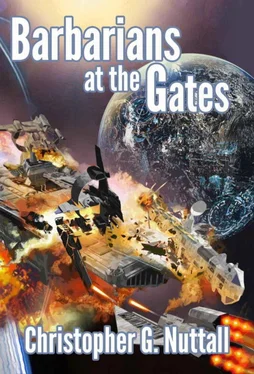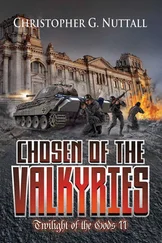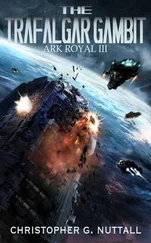“Aye, sir,” the communications officer said. “Plan B?”
“Plan B,” Roman agreed, and smiled. “Launch the drone.”
“Drone away, sir,” the communications officer said. “Direct data link established. If something happens to us, the drone will be updated automatically.”
“Helm, take us back to the Asimov Point,” Roman ordered. “Best possible speed.”
He’d expected Governor Hartkopf to order his defenses to attempt to intercept Midway as she headed towards the Asimov Point, but no one attempted to bar their way. Midway vanished through the Asimov Point and was gone.
“We’re clear, sir,” the helmsman reported.
Roman grinned. It had been Lady Tiffany who’d suggested a slight alteration to the original plan, one that her husband had enthusiastically endorsed. If Hartkopf refused to negotiate—if he prevented anyone else from learning about the negotiations—the Federation would make sure that the entire system learned the truth. The drone would start broadcasting a complete recording of the meeting and the governor’s rejection, right across the entire system. By the time the drone was destroyed—as it would be easy to locate—it would be far too late. And then Governor Hartkopf would discover how his subordinates felt about losing their last chance for safety.
Admiral Drake had even improved the offer carried by the drone. If someone took the governor’s head, the remainder of his subordinates could still claim amnesty.
“We’ve put the cat amongst the pigeons,” he said with a grin. “Helm, take us back to the admiral. Best possible speed.”
It is rare for the Senate to offer command of a sizable force to a single man. The reason for that is quite simple. An admiral has command of a force that will, as a general rule, obey him without question, perhaps following orders that end with a coup and the destruction of the Federation Senate. The more powerful the fleet, the more intrusive Senate interference becomes, something that was not unimportant during the opening battles of the Blue Star War…
-
An Irreverent Guide to the Federation , 4000 A.D.
FNS Magnificent , Eddore, Zathras Sector, 4097
From the observation blister, Marius could see his fleet, the greatest force assembled since the Blue Star War. The sight never failed to impress him.
It was surprisingly rare for entire fleets to be visible using the naked eye. Even the closest of formations allowed plenty of room between starships that could be up to six kilometres long, and the only time that starships flew closer together was during reviews. Now, however, the Federation Navy’s Grand Fleet—Marius had suggested the name and the Senate hadn’t demurred—hung in orbit around a red dwarf, running lights illuminating them for all to see.
Two hundred superdreadnaughts provided a solid core of firepower, backed up by nearly a thousand cruisers and destroyers. Ninety fleet carriers, seventy assault carriers and a hundred escort carriers provided over ten thousand starfighters to cover the fleet against enemy starfighters and missile fire. Behind the warships, the Fleet Train—two thousand freighters loaded with everything from missiles to crated starfighters—waited, providing all the supplies the fleet could need for a year of campaigning.
Marius wasn’t blind to the level of trust the Senate had placed in him. And he had no intention of losing the campaign. He knew just how weak the Senate was, as a government, but it was better than the alternative. Without a strong central authority, humanity would fall apart into chaos and the aliens would win.
He had no intention of losing. Anything.
He thought of Tiffany and found himself smiling. He’d been doing that a lot since he’d discovered that he and his young wife had so much in common. So far, they’d managed to build a life together, even if it wasn’t exactly what he would have chosen. Tiffany’s pithy observations on the Senate and High Society had helped to shape his own thoughts. He’d once regarded her, to his shame, as an encumbrance, but now…he found himself oddly terrified by the thought of losing her.
And he’d sent her into deadly danger.
“I saw that look,” Vaughn said. His oldest friend smiled at him. “You’re in love.”
“I suppose I am,” Marius admitted. It was odd how easy it was to say. “I wonder if you will be getting married, too.”
“Two years of marriage and he thinks he can tell us all to get married,” Vaughn said dryly. “I’m married to the Corps, as you know very well. And besides, I’m not the latest political sensation, for which we should all be grateful.”
Marius nodded sourly. “And what if you were?”
“I don’t think that I will ever be quite that important.” Vaughn frowned and abruptly changed the subject. “You do realize that nothing will ever be the same again?”
Marius quirked an eyebrow at him.
“The Federation almost came apart five years ago,” Vaughn explained. “The warlords came close to destroying what little unity we had left. When this war ends—when the last warlord surrenders or is blown away—what will we have then? A weakened Federation, and Outsiders threatening our borders.”
Marius stared at him. He’d never heard his friend sound so defeatist.
“What brought this on?”
“I have a child,” Vaughn admitted.
Marius gaped. It was news to him.
“A little girl,” Vaughn told him. “Her mother, when she realized that I would never be around, refused to allow me to spend much time with my daughter. And yet, she still wants to follow her daddy into the Marine Corps. What sort of universe is she going to inherit?”
“The very best one we can make,” Marius said. He pressed a hand against the transparent covering, staring up at his fleet. “When we crush Justinian, we can force the other warlords to surrender, and then…”
“We get caught up in a war against the Outsiders,” Vaughn pointed out. “The Senate is deluding itself if it thinks we can avoid it. The Inheritance Wars were bad enough, but this is going to be worse. All those races out there that have no choice but to grow up in a human universe, where we will only let them live if we restructure their society to fit our mold, and prevent them from becoming a threat to us.”
“I know. But this is the best we can do.” Marius wished he had a better answer, but he didn’t.
Vaughn nodded impatiently.
“Still. We’re on the eve of the greatest war in human history, and the Senate is acting like there’s nothing to worry about, not really.”
Somehow, Marius had to deflect this conversation.
“We can beat the warlords and we can beat the Outsiders too,” he said with a smile. “Once we start preparing for war…”
“That’s the question,” Vaughn said. “ When are we going to start preparing for war?”
The hatch opened before Marius could answer. Blake Raistlin popped through the hatch and saluted.
“Admiral,” he reported, “ Midway just transited the Asimov Point from Greenwich. They’re sending a data download now…”
Marius had to smile. “And the results?”
Raistlin managed to do a good job of pretending to be innocent.
“Come on,” Marius insisted. “Reading the data downloads is an easy trick…”
Raistlin would have flushed if his skin allowed it. “The negotiations failed, admiral,” he admitted. “The governor rejected our demands.”
“Well,” Marius said after a long moment. “I guess that means we will have to do it the hard way, won’t we?”
* * *
Marius disliked face-to-face briefings. The logistics of bringing so many superior officers onto one superdreadnaught—even if protocol was cut to the bare minimum—were nightmarish. Even the Magnificent , lovely lady though she was, didn’t have a compartment large enough for all the officers who believed they should be invited to the briefing as a matter of course. Indeed, coordinating so many starships was a tricky task in itself.
Читать дальше












